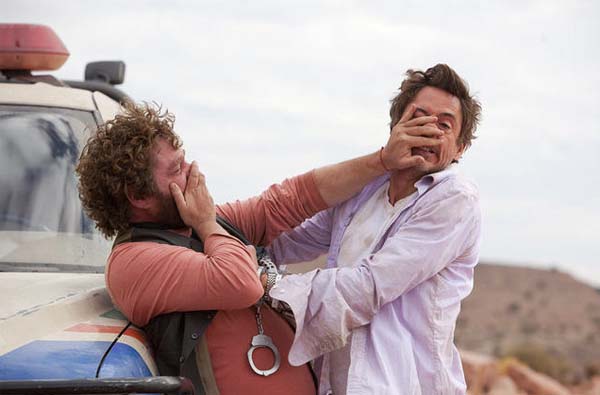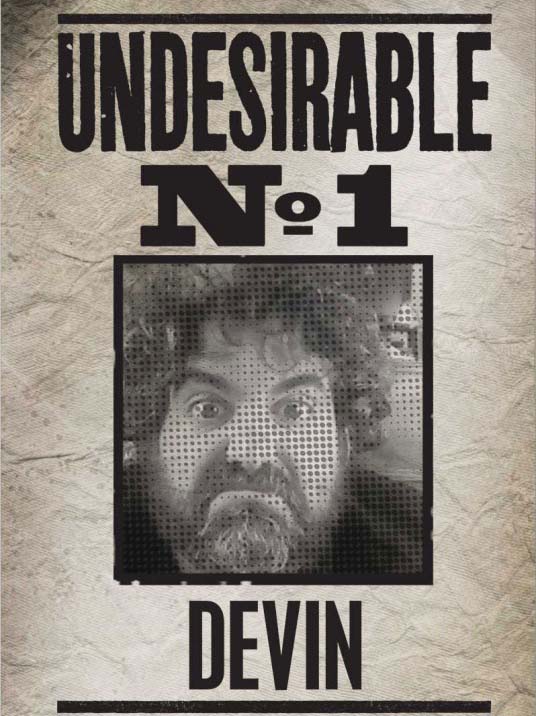I am generally quite supportive of fledgling cultural sites, both high and low. And it was with this spirit in mind that I took a quick peek at Badass Digest, a new venture run by the Alamo Drafthouse (a venue I wholeheartedly appreciate) and edited by a man named Devin Faraci, whom I now understand to be in the habit of berating people when he can’t get his way. I was unaware of Faraci’s history when I stumbled upon this erroneous report, claiming that director John Carpenter had “suffered a seizure at Florida’s Spooky Empire convention on Saturday October the 8th.” As someone who hopes that John Carpenter lives long enough to turn out a few more films, I was greatly concerned by this apparent “news.”
The problem was that Dread Central, the site that had initially reported this false rumor, got its news wrong. After someone named “Uncle Creepy” has posted the item, Carpenter’s wife had contacted Dread Central, informing the site that Carpenter did not have a seizure in Orlando and that he had collapsed from exhaustion. Dread Central had the decency to include this update (even if it did not change its misleading headline).
Badass Digest’s Devin Faraci didn’t change his headline either. Indeed, even at the onset, Faraci preferred reveling in the news with his tasteless headline, “Okay, Who Showed John Carpenter Rob Zombie’s HALLOWEEN?” (Never mind that, as interviews with both Rob Zombie and John Carpenter demonstrate, Carpenter urged Rob Zombie to make the film his own. One commenter in the thread would later point this out.)
I left this perfectly reasonable comment:
John Carpenter did not suffer a seizure. According to his wife, Carpenter had a flu and was exhausted. Dread Central updated its post. Please try doing some actual reporting (what real badasses do) rather than spreading misinformation like a common amateur.
Faraci responded in the comments:
Hi Ed. Rather than commenting like a common moron, maybe you could have noticed that this article was published on October 11th, before Dread Central updated its post. Yes, Ed, I was publishing content here before it was public. How embarrassing for you to be calling someone else out on an error when you’re in fact completely wrong. Or do you pick up copies of the New York Times from 2007 and become enraged that they refer to President Bush?
Ed, I hope you deal with the personal problems that would lead you to comb through a newly launched blog in an effort to deliver a correction. Or you can get fucked, whichever suits you best.
Never mind that I had observed in my comment that Dread Central had updated its post. I was aware that this was an October 11, 2010 item. But, on October 22, 2010, the item had not corrected the misinformation.
Indeed, as of today, the post still falsely states that Carpenter was “suffering a seizure.”
Why is this important? Well, let’s frame this as a crass thought experiment. Let us suppose that I am the “common moron” that Faraci suggests me to be. As a common moron, I am too busy to look up from my laptop to see that Faraci’s father is being raped with a night stick. Dread Central has reported that Faraci’s father is merely being kissed by another man. There is tangible experience before me that will help me to get a better handle on the story, if not aid the victim — namely, that Faraci’s father is screaming for help. But under the Faraci School, I must not believe anything else but a single source on my computer.
Just as there is a difference between “seizure” and “flu,” there is also a pivotal distinction between “raped” and “kissed.” Faraci’s father, in addition to recovering from a vicious rape that the insensitive “common moron” has failed to report properly (let alone assist in stopping), now has to spend a good deal of time attempting to clear up the misinformation that the alleged journalist has helped to promulgate.
Yet this is precisely the line of reasoning that Faraci promulgated in relation to John Carpenter. Had Faraci been an actual journalist, he would have picked up the phone. He would have called Carpenter’s people. He would have called the Spooky Empire convention. He would have contacted the hotel. He would have enlisted social networks to fish for eyewitness confirmation. He would have called the hospital. He would have talked to a doctor. In short, Faraci would have conducted actual reporting. Confirmation of rumors before reporting them.
All this would have made Faraci a journalist instead of some amateurish hack junketeer who screams at publicists like a petulant infant when isn’t given his rattle and who tells anybody calling out his slipshod standards to get fucked.
Rather than tell Faraci to get fucked, I have attempted to frame his incompetence through a crude patois he might understand. Let me attempt a more dignified approach.
Getting the details right are important. If you don’t believe this to be the case, then your blog — whether newly launched or well established — simply has no right to exist. You have no right to call yourself a news site. You have no right to be taken seriously by anyone.
For what it’s worth, I didn’t comb through Faraci’s site to find the Carpenter error. I stumbled upon it after devoting perhaps 30 seconds of my time to the site. But I think I will take up Faraci’s suggestion in an effort to demonstrate why he is unfit to practice journalism and why Badass Digest is deserving of either death or serious improvement (perhaps through a more capable employee than the incompetent Faraci).
Beyond the ignoble Carpenter gaffe, the real question here is just how much misinformation Devin Faraci can spread in one day. The unsurprising answer — based on going through a random day at Badass Digest (October 22) — is a quite considerable tally.
Adam Green post: Faraci erroneously refers to Hatchet II (Roman numeral) as Hatchet 2.
Green Lantern report: Faraci describes the forthcoming Green Lantern as “the most cosmic superhero movie ever,” proceeding to note that its “scope is so big it spans from the West Coast of the US to a planet at the center of the galaxy.” Aside from the needless hyperbole (which comes, apparently bought and purchased by studios, after Faraci had “visit[ed] the New Orleans set of the film”), if Faraci actually knew what the word “cosmic” meant, he’d understand that its extraterrestrial definition stands in sharp contrast to the earth itself, and that his vapid praise extends to misunderstanding the very modifier in question. But then Faraci is a guy so naive and unquestioning that he sees “life-sized cardboard cut outs of Tomar-Re and Kilowogg, the alien GLs who help train Hal Jordan,” and it never occurs to this incompetent that these cutouts might be red herrings to throw junketeers off. Has Faraci read the script? Has he talked with the director about this issue to get confirmation of Tomar-Re and Kilowogg’s appearances? He has not. But he has talked with the director, although not about any of the information he purports to be true (whether any of his hunches will prove to be the basis for the later report Faraci tends to file is a mystery, but his unwillingness to impart even one quote in support of his assertion should demonstrate his unquestionable indolence). Yet he is more happy to impart that “there was a Sinestro-themed cake for [Mark Strong] at lunch.” Journalism’s just desserts!
It also doesn’t occur to this profoundly naive man that he might have been invited to attend the set precisely because he had expressed his disappointment with footage at Comic Con 2010.
Faraci states that he got “the impression that Johns – the guy who has been writing Green Lantern’s comic book adventures for the past couple of years – was incredibly influential on the tone and direction of the movie.” But he never actually interviews Johns, who is standing right there, or anybody else to confirm that Johns’s Secret Origins storyline was part of the Green Lantern movie. In other words, Faraci is your typical rube taken in by flash and filigree. The writing equivalent of a baby elephant who jumps on his forelegs whenever he sees a bag of peanuts. The dog trained to salivate by Pavlov. One goes to Comic-Con to encounter dweebs like this. That they would believe themselves to be journalists merely by standing within five feet of a notable figure reveals the lax standards of present cultural journalism.
Of course, since “this isn’t the full report,” Faraci “can’t tell you too much.” Which begs the question of why he’s even bothered to file this piece in the first place. Journalism shouldn’t contain secrets. It should contain answers to questions. Quotes. Information that nobody else has. Confirmation of information. We get nothing even close to rudimentary journalism in Faraci’s blog post. But he’s happy to impart some “incredible concept art” that was given to him by the studio, urging his readership to “put this stuff on the side of a van” rather than parse it. Faraci, the used car salesman in action.
Over the Top toy story: Faraci’s lede: “Remember when Sylvester Stallone’s arm wrestling opus Over the Top changed the world for professional arm wrestlers everywhere? Probably not. In fact, if you think about cinematic arm wrestling at all you probably think about The Fly, which came out the year before, and had Jeff Goldblum snapping a fellow’s armbone [sic] through his skin during a heated bar match.” An “armbone,” eh? Is it the humerus? The forearm? Aside from the wretched prose, one is stunned that Faraci would be incapable of being more specific bout what is snapped — particularly since Brundlefly snaps his opponent’s wrist.
This lede offers some clues as to Faraci’s motivations. Here we have an aging man motivated by cinematic nostalgia, circa 1986 and 1987, that most adults have forgotten. (This pathetic nostalgia is also in place when Faraci appraises Black Francis as “one cool guy.”) Indeed, the nostalgia is so contagious that Faraci has only an approximate idea of what he’s seen rather than a working knowledge of it. Then again, this is the same misogynist who writes, “So what did you think of Paranormal Activity 2? Were Katie’s boobs as good as the first?” It is unclear whether Faraci is referring to the actress Katie Featherston or her character. One gets the discomfiting sense that this boob-hunting boob is probably referring to the former. As Joanne McNeil suggested back in September, “If you do something sexist, I think you are as dumb as the creationists. In some cases maybe even dumber.” (And Faraci says that I’m the one with personal problems.)
Faraci is indeed dumb as come. And that stupidity extends to more hypocrisy one post earlier when Faraci points to a double standard (indeed, the one that so many other journalists had brought up earlier in the day) between Mel Gibson being sacked from The Hangover 2 and Mike Tyson, a convicted rapist, appearing in The Hangover without a problem. How can a man, whose primary reason for seeing a horror film is to see if “Katie’s boobs [were] as good as the first,” even attempt to comment on such a moral issue? Faraci even closes his “editorial” by writing, “We love art and entertainment, not gossip and bullshit.”
“Were Katie’s boobs as good as the first?” The Green Lantern report laden with gossip and bullshit? Faraci’s feeble statement couldn’t be anything further from the truth.
Rabbit Hole trailer: “What else is it about? I don’t really want to know; all I need to know is that my buddy Scott Weinberg is quoted on the trailer giving effusive praise. And he’s a horror guy!”
More worthless speculation. Not only does Faraci announce how incurious and lazy he is in finding out more about the movie (“I don’t really want to know”), but the man is relying on a blurb from a suspicious review, in which Weinberg claims Rabbit Hole to be “flawless” and “quite simply, one of the best films I’ve ever seen at a festival.” Such over-the-top praise, coming from either a friend or a stranger, should make any real journalist suspicious. But Faraci, as has been clear all along, isn’t even a real writer. His puny excuse for a mind can’t even perform the most basic investigative inquiry, even if you pushed a pistol into his temple. His writing appears to have been purchased, whether by blind loyalty to a friend or blind loyalty to a studio. He doesn’t have the courtesy to link to Weinberg’s review to provide his audience with context. He doesn’t link to other reviews that might cast the film in a different light. Devin Faraci is no different from a hypnotized conformist staring into the camera, saying, “I loved it. It was much better than Cats. I’m going to see it again and again.”
Faraci also incorrectly italicizes Pulitzer. He refers to the Toronto International Film Festival as the “Toronto Film Festival.”
Spielberg a badass? If Faraci is seriously claiming Steven Spielberg, one of the most mainstream directors, to be capable of delivering “badass sci-fi,” then he clearly has no taste — particularly if he’s holding up War of the Worlds — a movie as safe as a turkey dinner — as a “badass” film.” (He makes no mention of Minority Report, which would arguably be more closer film to “badass” territory. This may be because, while Faraci apparently longs for 1980s nostalgia, his memory is worthless for any film in between what is instantaneously released and the movies he barely remembers from his wasted youth.) With typical illiteracy, Faraci doesn’t even mention Daniel H. Wilson’s name. Wilson is merely “the dude who wrote How to Survive a Robot Uprising, one of those 150 page, double spaced impulse buy novelty books that make people rich while you still work in a cubicle.” On the contrary, Wilson was a doctoral candidate at Carnegie Mellon’s Robotics Institute when he wrote the book. I’m also curious how someone can be an “ex-Buffy alum.” To my knowledge, Drew Goodard hasn’t renounced the widely regarded program which helped to kickstart his writing career. An alumni is a former member of an association. So Drew Goodard is merely a Buffy alum. Devin Faraci again demonstrates how little he comprehends the words he uses. He throws words around like a sad drunk walking into the kitchen and claims to be a culinary expert simply by recklessly swinging a hatchet.
The Spider-Man WTC poster: Once again, Faraci lets sensationalism preside over the facts. This time, he gets several facts wrong about a Spider-Man poster recall. The poster, issued before 9/11, featuring the World Trade Center reflected in Spidey’s eyes. On September 12, 2001 (not September 13, as Faraci claims), Sony issued a letter to theaters, asking:
Due to the devastating events that took place yesterday and out of respect for those involved, Sony Pictures Entertainment is requesting that all Spider-Man teaser posters and trailers be taken down and returned to the studio.
There is nothing in this statement to indicate that Sony wanted these posters to be destroyed, as Faraci suggests. But then what else can you expect from a man who uses the phrase “expense trailer?”
* * *
All of the above occurred during a 24 hour period. I shudder to think how many additional embarrassments I could find, should I decide to waste my life poring through this sad excuse for a website any longer. In one day, Faraci managed to misinform his readers, mangle the English language, fudge the facts, express casual misogyny, wiggle his sycophantic tongue in response to information he didn’t bother to investigate, get movie titles wrong, encourage his readers to blindly consume concept art that a studio fed him, wallow in nostalgia, and epitomize conformist opportunism at nearly every moment.
On August 19, 1896, when Adolph S. Ochs began to manage the New York Times, he published this announcement:
It will be my earnest aim that The New York Times give the news, all the news, in concise and attractive form, in language that is permissible in good society, and give it as early if not earlier, than it can be learned through any other reliable medium; to give the news impartially, without fear or favor, regardless of party, sect, or interest involved; to make of the columns of The New York Times a forum for the consideration of all questions of public importance, and to that end to invite intelligent discussion from all shades of opinion.
It is clear by the evidence that Devin Faraci is not only unwilling, but incapable of living by anything close to this credo. Here is a man who does not have exclusives. He cannot deliver the news impartially. He laps up any half-truth from the studios, living in fear that he will be ejected from screenings and garnering favor so that he won’t (which gives him license to shriek at publicists). He is utterly incapable of considering questions of public importance and, most importantly, incapable of inviting intelligent discussion from all shades of opinion.
Should Mr. Faraci decide to respond to the claims contained in this 3,000 word essay, and I certainly invite him to do so, it is doubtful that he will have much to offer beyond “you can get fucked.” And how does that make him any different from a common thug? How does such erratic behavior, such steadfast sloppiness, and such laughable entitlement make him any more qualified than some random guy plucked from a bar?
The answer is simple: By any standard, Devin Faraci is unfit to practice journalism in any form.
[UPDATE: An earlier version of this post, apparently loaded up from WordPress through a previous draft and not the correct one, misspelled Scott Weinberg’s name at one point as “Feinberg.” That error, noted by a reader, has been corrected. Additionally, Devin Faraci, despite the fact that he told me to “get fucked” on Badass Digest, has decided to ban me from commenting further on Badass Digest. He seems to think that I have started a fight with him or that I’m trying to drum up traffic. He is wrong on both counts. I don’t hate Mr. Faraci. I merely wish for him to examine what he is doing. But any kind of examination along those lines is outside his purview. Mr. Faraci has refused to respond to this article, claiming that I have mental problems and that this post is merely “an epic accounting of my typos.” He is wrong on both counts (again), but, to paraphrase Voltaire, I will defend his right to spout forth what he wishes. Unlike Mr. Faraci, I will let the readers make up their own minds about this article. And unlike Mr. Faraci, I will certainly not tell any commenter responding to this article to get fucked.]

[UPDATE 2: So I step away from the Internet for six hours to live my life, and I return home to find that Devin Faraci is accusing me of spamming his site. When, in fact, I haven’t visited it since he banned me. Again, Mr. Faraci demonstrates that he’s more interested in false accusations than pursuing facts, which continues to support my thesis that he is unfit to practice journalism.]





